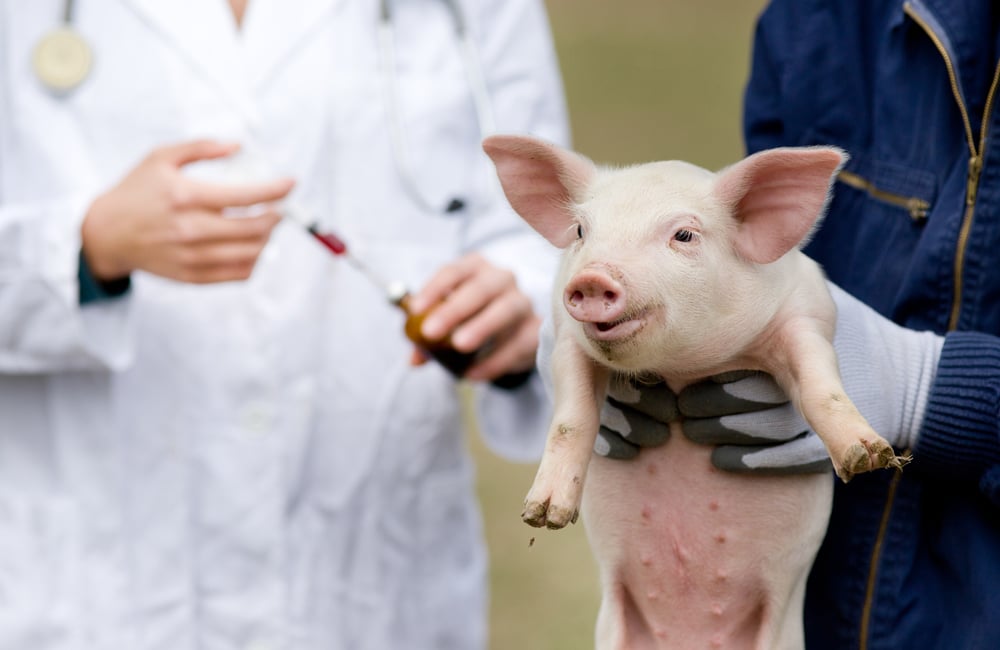May 21, 2025 | 04:37 GMT +7
May 21, 2025 | 04:37 GMT +7
Hotline: 0913.378.918
May 21, 2025 | 04:37 GMT +7
Hotline: 0913.378.918
Speaking at the “Consultation meeting to support the implementation of the roadmap for strengthening the management capacity of Vietnam's veterinary services in Vietnam, 2021-2030”, Ms. Pauline Tamesis, United Nations Resident Coordinator in Vietnam affirmed that Vietnam has performed extremely well in the past several years.
Livestock is an essential part of agroecosystems. However, as one of the fastest-growing economies, Vietnam faces many threats affecting livestock production, including threats from animal diseases.
“Animal health is a core element for livestock production and its sustainable development. But rapid changes in livestock production increase the potential for new pathogens to emerge, grow and spread from animals to humans. We know from experience and research that healthy animals are closely related to healthy people and a healthy environment”, said Ms. Tamesis.

Ms. Pauline Tamesis, United Nations Resident Coordinator delivered a speech at the meeting.
It is well established that animal diseases can have a significant impact on livestock production, trade, livelihoods, food security, and national economies, as well as on human health.
When African Swine Fever (ASF) was introduced to Vietnam in 2019, the disease affected 8,537 of Vietnam’s 11,129 communes resulting in a significant reduction in the pig population and subsequently increased pork prices throughout the country.
The outbreak of human influenza A(H5N1) in Phu Tho last year, which was the first human H5N1 infection in Vietnam since 2014, also reminded us of the risk from highly pathogenic avian influenza which can be transmitted from poultry to humans.
Furthermore, animal diseases can severely affect endangered or threatened wildlife populations and disrupt biodiversity conservation efforts as shown by the outbreaks highly pathogenic avian influenza in North America.
“It is important for us to work together to strengthen Vietnam Veterinary Service System to mitigate the impact of animal and zoonotic diseases, that threaten our livelihood and food security. A strong veterinary system is essential to ensure that “no one is left behind” in the country’s journey to high-income status.", said the UNRC representative.
Preventing disease emergence and spread, and meeting the global demand for food, while ensuring the effective functioning of agroecological systems and ecosystems, requires a One Health approach.
At the global level, the Quadripartite Organizations – the Food and Agriculture Organization of the United Nations, the United Nations Environment Programme, the World Organisation for Animal Health, and the World Health Organization – collaborate to drive the change and transformation required to mitigate the impact of current and future health challenges at the human–animal–plant–environment interface under the One Health Joint Plan of Action.
In Vietnam, FAO, in collaboration with the Ministry of Agriculture and Rural Development, the World Health Organization, and several other UN agencies and development partners, have been working together to tackle the threats to health and the ecosystem.
With support from several donors, the UN system in Vietnam has been able to deliver joint programs and projects such as the FAO-WHO Global Health Security Programme, the FAO-UNODC-UNEP Safety Across Asia for the Global Environment projects, and many other activities that have contributed to the National One Health Master Plan 2021 – 2025.
To strengthen the country’s One Health capacity, we have been supporting the One Health Partnership for zoonoses and antimicrobial resistance since its inception in 2016 and organized several multi-sectoral One Health events including the Joint Risk Assessment workshop, World Rabies Day, and the World Antimicrobial-Resistance Awareness Week.

A strong veterinary system is essential to ensure that “no one is left behind” in the country’s journey to high-income status.
The approval of the National Strategy for veterinary service system development is a testimony of the Government of Vietnam’s strong commitment to safeguarding the welfare and food security of its people while driving the sustainable development of the livestock sector through effective control of animal diseases, protection of public health and integration of livestock sector in the global trade.
“On behalf of the United Nations in Vietnam, I would like to call for your strong collaboration and support for the implementation of the strategy for veterinary service system development.
The recent coalition of stakeholders, under the leadership of the Department of Animal Health, Ministry of Agriculture and Rural Development, to quickly respond to the first call for proposals from the Pandemic Fund, has demonstrated the capacity of Vietnam’s veterinary services to act efficiently and effectively.
With your strong collaboration and support, we can propel Vietnam’s veterinary service system to meet its commitment. Your support will not only directly contribute to the sustainable development of the livestock and agriculture sector, but also to the overall development of the country”, Ms. Tamesis said.

(VAN) In 2024, over 295 million people across 53 countries and territories faced acute hunger—an increase of almost 14 million people compared to 2023, while the number of people facing catastrophic levels of hunger reached a record high.

(VAN) World Environment Day 2025 (June 5) carries the theme 'Beat Plastic Pollution' continuing to emphasize the global urgency of addressing the plastic waste crisis.

(VAN) This was the assessment shared by experts at the workshop titled 'Assessing the Role and Potential of Low-Emission Rice Production Systems in Vietnam,' held on the morning of May 19.

(VAN) Cai Rong Port is the fisheries control center of Quang Ninh, helping to monitor fishing vessels, combat IUU fishing, and remove the EC's 'yellow card'.

(VAN) The German Agricultural Society (DLG) explores the possibility of establishing a mechanization service center in Vietnam’s Mekong Delta to support farmers in accessing and utilizing advanced machinery.

(VAN) On May 16, the Department of Water Resources Management, in collaboration with the Food and Agriculture Organization of the United Nations (FAO), held a signing ceremony for the GEF-8 project document.

(VAN) Food safety, mechanization, vocational training, and market opening are key areas of cooperation expected between the Vietnamese Government and the Federal Republic of Germany.